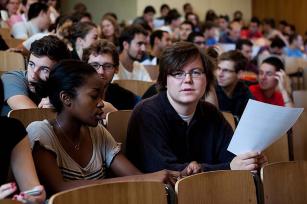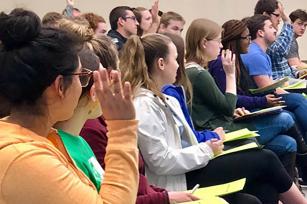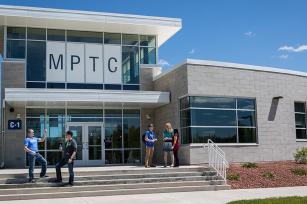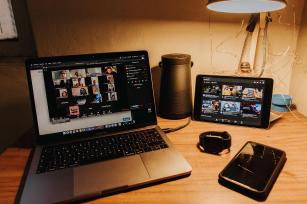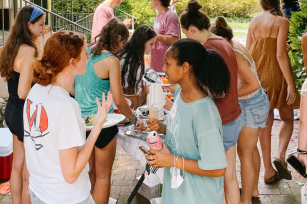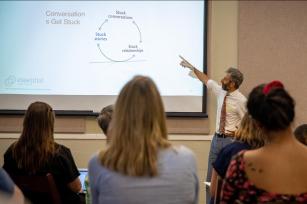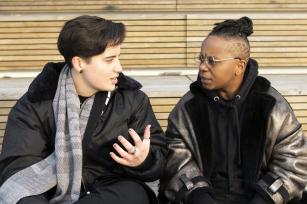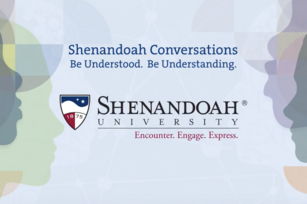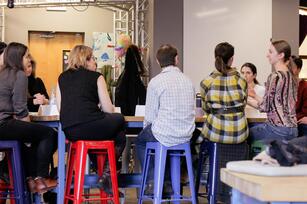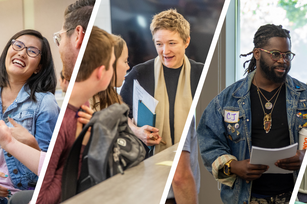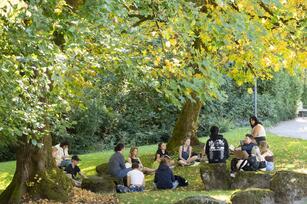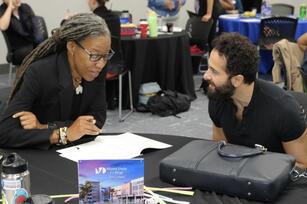
Breadcrumb
- Essential Partners
- Our Impact
- Impact Stories
- Leading by Listening with Mount Holyoke and Smith Colleges
Leading by Listening with Mount Holyoke and Smith Colleges
In college, the idea of leadership development can be overwhelming, with terms like “lean in” pervading popular culture as students are repeatedly told they need to stand out to survive in the post-graduate world.
Mount Holyoke College and Smith College chose a more structured, supportive approach.
The schools’ respective Weissman Center for Leadership and Wurtele Center for Work and Life offer a series of student leadership workshops in partnership with a local program for women interested in running for public office.
The multigenerational group of students, staff, faculty, and community members came together for Essential Partners' workshop “Leading by Listening."
Led by practitioners Sallyann Roth and John Sarrouf, the workshop sought to address the question of what it means to listen deeply and respond from a thoughtful and reflective place, whether leading a study group, a campus organization or a business.
“The most profound workshop”
Through structured exercises and reflection facilitated by Essential Partners, roughly 100 participants gained a clearer sense of their own "center," and how to listen with resilience to difficult feedback.
Small breakout groups discussed what it meant to listen for the hope within the concern, the solution within the complaint, and the interest within the position. In small breakout groups, the students created space for a deep kind of listening—both to hear their own voice, and among their community.
Janet Lansberry, Assistant Director of Mount Holyoke College's Weissman Center, found herself surprised.
“Other workshops had been more focused on techniques and tips,” she remarked, “and I think that’s what I was expecting. What we had instead was probably the most profound workshop that we ever brought to campus. It offered a really unique foundation in personal insight.”
This more reflective approach is essential for honing a critical aspect of truly impactful leadership: emotional intelligence. According to Lansberry, “There’s been so much research showing that understanding yourself, your motivations, and the effect you have on other people is a skill of leaders that are really having an impact.”
learning how to listen
According to Lansberry, “The audience left the workshop with a new appreciation for the important role of listening as well as personal insights, skills, and approaches to take with them into the future.”
In fact, 96% percent of respondents said they would recommend this workshop to others. Students cited a range of new skills learned throughout the workshop: “Getting to a solution is not the goal of a conversation or listening spaces, but trying to understand each other.” Another student talked about “realizing that I have a voice, choice in every conversation, and conflict that I experience.”
Iyanna James-Stephenson, class of 2015, shared an important takeaway for her understanding of how to deeply listen, rooted in self-awareness. “In practicing self-care with our listening techniques, I recognize that we will always be learning how to listen; always learning how to be a better leader. You can recognize times when you haven't listened to someone, whether you refused to listen or you were unable to listen. You can always rekindle those times that you were not the best listener.”
By focusing on one’s own perspective, Iyanna added, “You can come to mental and emotional closure by rebuilding or respecting the mental and emotional health of the person you may not have listened to.”
Related Impact Stories
Testimonials

Anjali Bal, Associate Professor of MarketingWe talked about where we are in the world right now, so we talked quite a bit about polarization. Essential Partners showed how these conversations are becoming more taxing and challenging because of that polarization. These were some first steps in terms of how we can start to have those conversations.
Babson College, MA

Undergraduate StudentThe most significant thing for me was learning how to ask for more information rather than trying to persuade a person to think differently. I also learned helpful dialogue tips, which are more effective during difficult conversations. If I encounter a difficult dialogue with any of my residents, I plan on using the techniques I learned in this workshop to facilitate those talks.
Northeastern University, MA

Undergraduate StudentDuring one dialogue, as we were reading The Joy Luck Club, we were asked to discuss our relationship to America. There were students who grew up in the United States and also those who hadn’t—and I was surprised to hear that everyone had equally complex relationships with the topic.
I appreciated being able to hear and express the full depth of our own context before delving into a discussion about first-generation immigrants.
Gordon College, Massachusetts

Program ParticipantThis is the best adult learning experience I have had in the past five years. I wanted to learn new skills—I did!

Janet Lansberry, Weissman Center Assistant DirectorThis was probably the most profound workshop that we ever brought to campus. It offered a really unique foundation in personal insight.
Mount Holyoke College, MA

Undergraduate StudentI have learned how to not be offended and to be better prepared to receive other people's communication. You don't have to agree, but you can respect the other person.
Randolph College (VA)

Lucinda Garcia, Researcher, Educator & AdvocateThe Dialogic Pedagogy Fellowship at Tufts University, in collaboration with Essential Partners, gave me transformative social-emotional learning and facilitation skills to support meaningful dialogue in the classroom. I’m excited to apply what I’ve learned to design questions that invite personal narratives, value-based discussion, and comfort with complexity—all in service of building a classroom climate where productive dialogue and engaged learning can flourish.

Program ParticipantI did not anticipate having as many concrete takeaways as I do. I feel there is an immense practical application.

Undergraduate StudentI feel more comfortable participating in class and less defensive when other students disagree. And because I learned more from my fellow students about their views, I now feel less competitive with them than in other classes.
Bridgewater College, Virginia

Ben Meoz, VP for Student Life and Dean of Students“We want to cultivate genuine curiosity among students so that they really open themselves to the needs of others and also feel like others have an awareness of what their needs and experiences are.”
Lewis & Clark

Undergraduate StudentI notice that my classmates take much more care when speaking about people who practice other religions. They make fewer assumptions, and they’re more careful with their words to make sure to avoid unintentional connotations.
Bridgewater College, Virginia

Undergraduate StudentI started to trust everyone in the class—I felt heard and I felt that people wanted to listen. As a result, I wasn’t afraid to let my past come out and let people learn from what I have been through.
Bridgewater College, Virginia

Beth MendozaDialogue gets more results. It makes decision-making easier. It makes creating participation easier … our greatest organizational impact has been more contributions as well as more effective and efficient meetings.
Moraine Park Technical College, Wisconsin

Undergraduate StudentAs a pharmacy major, I do not receive much training on how to handle difficult or controversial conversations. I think that this training will help me not only in my duties as a resident assistant, but in discussing medications and therapies with future patients when the conversation becomes difficult.
Northeastern University, MA

Kim Davidson, OmbudsI’ve gained not only confidence but tools. The Essential Partners training was worth every penny.
Oberlin College, Ohio

Program ParticipantI felt an amazing sense of accomplishment when the Essential Partners training ended; that I'd done something important for my community and something important for me.
Massachusetts

Megan DeFranzaThere is a need not only for safe space within our churches but for our church leaders who often feel alone, or who may feel their job could be at risk if they engage in controversial conversations. How are they to make safe spaces in their own congregations for healthy dialogue if they rarely experience safe space to do the same?
Gordon College, Massachusetts

Undergraduate StudentAt the beginning of the semester, there was not much participation in class. But by the end, almost everyone had something constructive to add every day.
Bridgewater College, Virginia

Anne Hopkins Gross, Dean of StudentsThe Essential Partners workshop was a way of building up our ability to talk about more difficult issues, such as poverty and GLBTQ safe spaces. It was really the foundational entrée into those more challenging issues of race, ethnicity, sexuality, and gender. People walked away feeling much more confident about having difficult conversations.
Southern Vermont College, VT

James Rucker, Faculty MemberIt is really different than it was before. The Essential Partners process has given me the power to be heard and be seen. It’s unreal.
Randolph College (VA)

Etionette Nshirmirimana, Burundian Master TrainerI realized that by using the “dialogue” approach, people could talk of what is deep in their heart, especially things that have harmed them.
Burundi

Megan DeFranzaHere safe space was created for pastors and church leaders to wrestle with topics like evolution which are all too often “off limits” or believed to be antagonistic to the faith.
Gordon College, Massachusetts

Undergraduate StudentWe tackled really difficult topics and this helped everyone know each other and understand each person's individual perspective. Over the course of the semester, I became much more comfortable engaging with my classmates—specifically because of the peer dialogue groups.
Bridgewater College, Virginia

Karen Ramirez, Director of the CU Engage ProgramWe get more requests [for campus dialogue] than we could ever respond to.… I’m proud that our work on campus is actually kind of unusual, because it doesn’t support just one population. It supports everyone—students, staff, faculty, graduate students. I don’t know if there are other University of Colorado projects going on that hit all of our campus population.
University of Colorado, Boulder

Undergraduate StudentDialogue challenged us to think more deeply about the class topics. Talking about our own thoughts and experiences in relation to the topic also challenged us to think about our own views and articulate them more clearly.
Gordon College, Massachusetts

Undergraduate StudentIt’s nice to talk about things that we encounter all the time but rarely get talked about. This made me hopeful that there are people who are willing to talk about serious issues.
Dartmouth College, New Hampshire

Patrick Hale, director of Multicultural and Identity ProgramsOne of the things that’s so crucial to even fostering dialogue around diversity, equity, and inclusion is creating opportunities for folks to engage in deep reflective self-awareness.
Babson College, MA

Undergraduate StudentEvery opinion was accepted. No one felt judged or uncomfortable talking to one another. These have been, by far, the best classroom discussions I have ever had.
Bridgewater College, Virginia

Undergraduate StudentThe professor was able to engage every student. She encouraged them to present new ideas. Dialogue helped create an environment that really deepened the understanding of the material.
Southern Methodist University, Texas

Anjali Bal, Associate Professor of MarketingOne of the things that we talked about was the ability to hear another person’s point of view, even if our minds aren’t changed. We have to remember that any sort of movement is movement. If we don’t acknowledge small movement, then we just stay on two different sides, and it’s all black and white, and we don’t hear each other.
Babson College, MA

Nicki Glasser, Policy CoordinatorWhat surprised me was how much you could transform a relationship during a three-hour conversation.
Transformation Center, Massachusetts

Undergraduate StudentI learned to expect the best of my classmates, even when we don’t agree. I can’t write off their opinions anymore, despite our disagreements.
Bridgewater College, Virginia

Noga Shemer, Associate Professor in Anthropology“Students come to university so they can think deeply about issues that matter. They are the future, and the stakes are high. They want spaces where they can think these things through.”
University of Connecticut

Janet Bixby, Director of Community Dialogues“Essential Partners has the magic sauce—its trainings. Working with Essential Partners and Community Dialogues has enabled us to say, ‘Hey, we have tools to help us be able to do this, and we have ways to do this. We can address these things.’ That's been incredibly useful and powerful.”
Lewis & Clark

Noga Shemer, Associate Professor in Anthropology“When I started bringing the RSD model into the classroom, it changed everything, and I had this overwhelming sense of what the classroom could be. The student feedback was unlike anything I had seen before. Students said, ‘Wow, why haven’t we had the chance to do this before? And why don’t we get to do this more often in our education?’”
University of Connecticut

Dr. Brooke Vuckovic, Clinical Professor of Leadership“The Dialogic Classroom is by far and away the most skillful and thoughtful professional development I have had in years as an educator.”
Kellogg School of Management

Dr. Jill DeTemple, Religious Studies FacultyAfter using this approach in my classroom, I am now more willing, and more able, to engage students in meaningful conversations about potentially contentious issues. Whereas I used to nod toward things like homosexuality in religious life, interfaith marriage, or the role of government in reproduction, now I build these conversations into the class so students can learn to speak about their experiences, and so they learn to listen and learn from those with whom they might disagree.
Southern Methodist University, Texas

Jamie Kleinman, Associate Professor“I want every STEM class to have a dialogue. Imagine if the students had more practice doing this in more of their classes. It really speaks to the nature of approaching this from a systems perspective and how big a need there is for that.”
Department of Psychological Science, University of Connecticut

Amy Cottrill, Birmingham-Southern CollegeThe past few years in our country have been the most divisive and alienating in my lifetime, which can be a tremendous challenge in the classroom that aims for community, shared experience, and listening with empathy to opinions that are different from one's own. The Essential Partners workshop I attended provided invaluable tools to meet the challenges of teaching today. It helped me reimagine the classroom as a place to help students learn the essential tools of living and learning in community and interconnection, skills that are necessary in every single area of life. I have no doubt that my teaching has been dramatically reshaped in light of my introduction to structured dialogue and I feel like I have so much more to offer my students because of that.
Birmingham, AL

Katie Shear, Civic Engagement CoordinatorUsing what we learned from Essential Partners, staff were able to model effective and respectful communication for students. A next step would be for us to help students employ some of these methods themselves. The staff not only gained skills in communication but also left feeling supported by each other in the work that we do.
Southern Vermont College, VT

Bob Bordone, Expert and AuthorEssential Partners does the best work in the field of dialogue and communication.
Harvard Negotiation & Mediation Clinical Program, Co-Founder

Teresa Grettano, Associate Professor and Director of the First-Year Writing programFacilitated dialogue creates a classroom atmosphere in which exploring uncomfortable issues and asking difficult questions is an expected part of the process, and it allows students space to engage each other without fear of the vitriol common in our public discourse.
University of Scranton (PA)

Undergraduate StudentI learned a lot about myself from others’ perspectives—it was comforting to hear similar values and ideas expressed, yet really eye-opening and intriguing to hear very different philosophies.
Dartmouth College, New Hampshire

Cricket Fuller, The Christian Science MonitorThis wasn’t a policy debate [about guns]. Instead, two people whose backgrounds and views diverged in almost every way possible shared a moment of honesty that struck at the heart of the matter.
Boston, Massachusetts
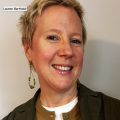
Lauren Barthold, Philosophy FacultyI’ve learned that it is not enough to announce my commitment to dialogue and expect students to know what I mean; I need concrete exercises to allow students to learn how to do it.
Endicott College, Massachusetts

Alex Lyford, Assistant Professor of StatisticsI can't possibly overstate the positive effects the Dialogic Classroom training had on the curriculum and approach to my Introduction to Data Science class. The difference in the course from a year ago and now is night and day. My lectures are now filled with meaningful discussion and discourse—often related to sensitive topics that I wouldn't have dared touching without the training. Student feedback about these discussions has been overwhelmingly positive, and there is no chance that I would have had the wherewithal or initiative to revamp the course in such a dramatic manner without the training.
Middlebury College

Elizabeth Zehl, Undergraduate StudentEssential Partners' process gives people the space to be intellectually curious and to engage with others on important issues in a way that also benefits their own understanding of what they believe.
Randolph College (VA)

Jonathan Noyalas, Director of the McCormick Civil War Institute“RSD has been the most transformative thing in my 21 years of teaching. … Students have a greater desire to open up in class about things because they know that a Noyalas class is a safe environment. ‘I can say things here. I’m not going to be judged. I understand I’m contributing to a broader conversation.’”
Shenandoah University



